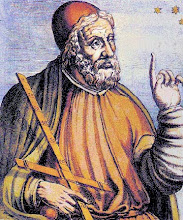In the play
Julius Caesar, Brutus is the most interesting character to me. Brutus is a man of high rank in Rome. He is a powerful public figure. He is seen by others, and by himself, honorable throughout the play. In Act I Scene 2 lines 88-89, Brutus says "I love the name of honor more than I fear death". This shows how honorable he finds himself. He always wants what
he finds is best for Rome. Though being honorable can be a good trait, Brutus also has a flaw of being very gullible and naive. He constantly misjudges others' character. Cassius at the beginning of the play, easily convinces Brutus that Caesar must be killed. Cassius uses Brutus's idea of honor to sway him to go against Caesar. Brutus doesn't see that Cassius's intentions are truly dishonorable. Also later in the play, Brutus misjudges Marc Antony's character several times. When talking with the conspirators, Brutus says that Antony doesn't need to be killed since he is nothing without Caesar, "And for Marc Antony, think not of him; For he can do no more than Caesar's arm when Caesar's head is off". He underestimates Antony. Later at the funeral he also lets Marc Antony speak to the people. Brutus doesn't realize what Antony is capable of. When it comes down to it, Brutus is constantly trying to do what he finds in noble and honorable. Unfortunately, he is easily swayed and convinced into thinking wrongdoings are right. In the end, he truly wants what is best for Rome. Marc Antony even says in Act V Scene 5 lines 68-73 "This was the noblest Roman of them all. All the conspirators save only he did that they did in envy of great Caesar; He, only in a general honest though and common good to all, made one of them". Though the other conspirators just envied Caesar, Brutus truly thought it was best for all of Rome. Brutus has a medium morality just because he does things for the common good. The things he does are of low moral but his intentions are good, putting him in between low and high morality.
I found that Brutus is the most interesting character because of his struggle between right and wrong. He is conflicted with what is and isn't honorable. It was interesting to watch him act on what he truly thought was best. Standing by his honor became an admirable trait for him. Brutus is the most interesting because his honor set him apart from the other conspirators. He sticks out from the other characters in the play. Unlike ALL of the other characters in the play, he isn't power-hungry or want to up his position in Rome. He really just cares for Rome.
Brutus is kind of like Lucy from The Chronicles of Narnia because of the fact that they are too trusting. They can misjudge people. Like Brutus misjudges Cassius and Marc Antony, Lucy misjudges Mr. Tumnus. Right off the bat, Lucy trusts Mr. Tumnus and even goes to his house with him. Little does she know that Mr. Tumnus plans to kidnap her and take her to the evil white witch. Though Brutus is under
slightly different circumstances, they still have that trait in common.

